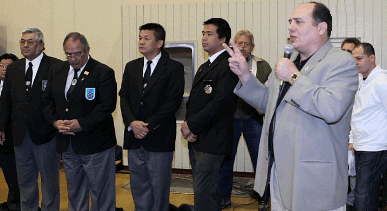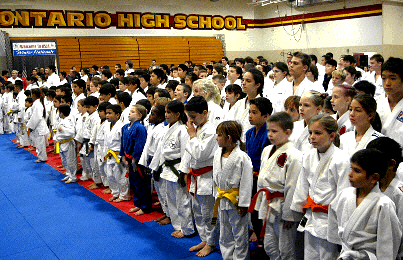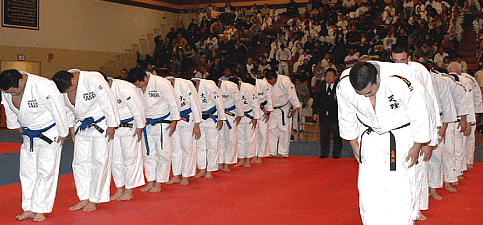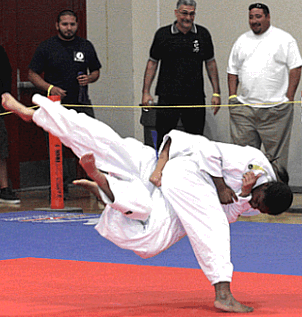
Daily Bulletin - December 13, 2007
Talking judo with Gary Goltz
by Andrea Bennett, Staff Reporter
Photos by Gary Wagstaff

Gary Goltz opening the 2nd Annual USJA Winter Nationals
Gary Goltz, is founder and sensei of Goltz Judo Club in Claremont. The Upland resident, (now an) 8th Degree Black Belt in the Japanese martial art and serves as Chief Operating Officer of the U.S. Judo Association. He recently hosted the Judo Winter Nationals (see article below). Goltz, who runs a Business Development Consulting Firm, teaches classes at the Alexander Hughes Community Center in Claremont, where his club ranked among the top of the US Judo Association, will be celebrating its 20th anniversary next month.
Question: How did you get into judo? Why?
Answer: I got into judo in 1965 at age 11 because "The Green Hornet" was real popular on TV, and I watched Bruce Lee do all these moves. I was a kind of non-athletic kid who was last pick for basketball, baseball and football. I signed up for judo at the Jewish Y in Pittsburgh. The instructor turned out to be a world-class judo player - Kyu Ha Kim, and I was mesmerized by him and still am. It was just fate.
Q: Tell me about judo.
A: Judo involves primarily throws, pins, armlocks and strangle holds. Also, we have some striking but it's used mostly in self-defense. It's the first martial art to be accepted in the Olympics in 1964. The moves tend to be to subdue a person, so it's used in law enforcement. I'm a volunteer defensive tactics adviser for the Los Angeles Police Department.
Q: Have you ever had to use your skills in real life? When and why?
A: Yes. I was a paperboy for the Pittsburgh Press in '68, and there were a bunch of paperboy robberies at that time. Back then, paperboys actually collected the money. Three guys drove up and two guys got out - one behind me grabbed my arms and one in front said, `give me the money.' I said, `You're right in front of my house. My dad's going to come out.' They thought I was bluffing. The guy in front went to punch me, and I blocked the guy's punch and kicked him in the groin. He buckled over, and I used a shoulder throw on the other guy and threw him on the hood of my dad's car. They drove away as fast as they could, and my neighbor saw the whole thing. The next day, it was in the press. One of my teachers read the story out loud in class, and I never got bothered in school again. I still have that paper.
Watch Goltz Perform a Judo Self Defense Kata
Q: How has judo shaped the way you live and see the world?
A: It's my life. It's taught me to take risks and to get up after you fall or after you fail. It's allowed me to be a leader in all aspects of business. I got my MBA and have done real well in the business world. I attribute it all to judo. It's given me an edge my whole life. That's the reason I teach, to share that knowledge and give back to the community.
Q: Are there any challenges in judo you still must overcome? What are they?
A: Judo is an ongoing process. The Japanese business concept, Kai Zen, came out of the martial arts. It's a continuous improvement process. There's no end to learning. Probably, I'd like to learn a few Katas (pre-arranged forms) I haven't learned yet.
Q: How did you come to start the Goltz Judo Club in Claremont in 1987?
A: I moved to Upland in `85 when my daughter (Callae, now 25) was just 3 years old. The nearest judo club was in West Covina at the Japanese Community Center, so I drove there to practice. When my daughter turned 7, I wanted her to have a place to go, so I started a class at Chaffey Community College. As we grew and needed more days, I found the city of Claremont Human Services Division, and I've been with them since.
Q: What's the most difficult thing for people just learning judo?
A: To get over the fear of falling. If you're afraid to fall, you'll always be stiff and get thrown more and possibly hurt. You have to learn to relax and take a fall properly. Judo teaches you how to fall and get back up.
Q: What is your proudest moment in the sport?
A: When Mr. Kim told me a few months ago I was his most accomplished student. That's the best thing you can hear. He gave me his old panel belt which he could've given it to his son. Mr. Kim still motivates me.
Q: What are your goals personally and for the sport?
A: I want to see judo grow and become like it was back in the '60s when three times more people in the U.S. where doing judo. All these other martial arts got to be popular and much more commercial. I want to get judo where it should be in this country. Personally, I want to continue to improve. The ultimate goal in judo is perfection of character and that translates to becoming a fully self-actualized person, who knows and likes himself and contributes to society.
Q: What other things do you like to do for fun?
A: I own a 1955 Buick "Highway Patrol" car based on the old TV show starring Broderick Crawford. I take it to lots of events, and I've met all kinds of people and done parades. Five years ago, I started an event called "10-4 Day" on Oct. 4 to honor the California Highway Patrol and people in law enforcement, with classic police cars parading down Hollywood Boulevard. It's turning into a major event.
For more information e-mail Goltz at gary@goltzjudo.com
Thousands attend judo tournament

Junior judo competitors line up at the USJA Winter Nationals
Thousands from around the world came out to Ontario High School earlier this month to fight. The event was the 2007 Judo Winter Nationals, and contestants in the Japanese martial art ranged from ages 5 to 65. "It was a smashing success by all accounts," said Sensei Gary Goltz, tournament director and founder of Goltz Judo Club in Claremont.
The two-day annual event was held Dec. 1 and 2. Clinics were offered by judo champs like Olympian Ronda Rousey of Santa Monica, and exhibitions were held featuring stars like the Taisei High School Judo Team of Japan. Competitors, too, came from all over the globe, including Portugal and Denmark. "You meet people from all over the world who have love for judo," Goltz said. "It's an international sport that brings people of different backgrounds and religions together in a common bond."

The Team from Japan and the U.S. bowing in before their contest
According to Goltz, the sport also builds character and instills a certain philosophy in its participants. "You learn to get up after a fall, and that's a metaphor for life," he said. "We have a saying in judo - `Fall down seven times. Get up eight.' We encourage people to face adversity head-on. If you lose, so what?" Matched according to age, gender and skill level, competitors young and old each took that perspective onto the mat during the event.

A perfect judo throw executed at the contest
"Judo is an individual sport, not a team sport," Goltz said. "It's really all you when you're out there. Theoretically, in a match against someone equal in strength and skill, what makes you prevail is your own tenacity. "A lot of times, the person who takes the fall is the person who blinked."
Judo may have saved the day more than once, too - from women who have fended off attackers to Jeremy Glick, a collegiate national champion, who helped divert Flight 93 on Sept. 11, Goltz said. On Saturday, Goltz Judo Club celebrated its 20th anniversary.
For more information visit www.goltzjudo.com
FYI - A few Japanese words used in judo
Judo: Gentle or flexible way
Judoka: One who studies judo
Sensei: Teacher, instructor
Shiai: Contest or sparring
Kata: Pre-arranged exercises
Randori: Free practice
Dan: Black belt rank
Goshin Jutsu: Judo self-defense forms
Kiai: To gather spirit with a shout
Seiryoku Zenyo: Make best use of energy
Jita Kyoei: Go forward together in harmony
Fusegi: Escapes
Kuzushi: Unbalancing the opponent